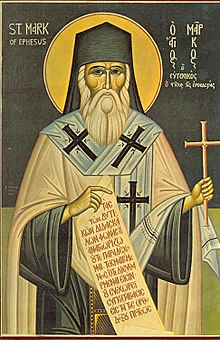
Back مرقس الأفسسي Arabic مارك اوف افيسوس ARZ Марк Ефески Bulgarian Marc Eugènic Catalan Marek Efezský Czech Markos Eugenikos German Μάρκος ο Ευγενικός Greek Marcos de Éfeso Spanish Markus Efesolainen Finnish Marc d'Éphèse French
Mark of Ephesus | |
|---|---|
 Icon of Saint Mark of Ephesus | |
| Defender and Pillar of Orthodoxy Archbishop of Ephesus | |
| Born | c. 1392 Constantinople, Byzantine Empire (modern-day Istanbul, Turkey) |
| Died | June 23, 1444 (age 52) Constantinople, Byzantine Empire (modern-day Istanbul, Turkey) |
| Venerated in | Eastern Orthodox Church |
| Canonized | 1734, Constantinople by Patriarch Seraphim of Constantinople |
| Major shrine | Monastery of Saint Lazarus, Galata modern day Karaköy, Turkey |
| Feast | 19 January |
| Attributes | Long white beard, vested as a bishop, holding a scroll in one hand and cross in the other |
Mark of Ephesus (Greek: Μάρκος ὁ Ἐφέσιος, born Manuel Eugenikos) was a hesychast theologian of the late Palaiologan period of the Byzantine Empire who became famous for his rejection of the Council of Ferrara–Florence (1438–1439). As a monk in Constantinople, Mark was a prolific hymnographer[1] and a follower of Gregory Palamas' theological views. As a theologian and a scholar, he was instrumental in the preparations for the Council of Ferrara–Florence, and as Metropolitan of Ephesus and delegate for the Patriarch of Alexandria, he was one of the most important voices at the synod. After renouncing the council as a lost cause, Mark became the leader of the Orthodox opposition to the Union of Florence, thus sealing his reputation as a defender of Eastern Orthodoxy and pillar of the Eastern Orthodox Church.